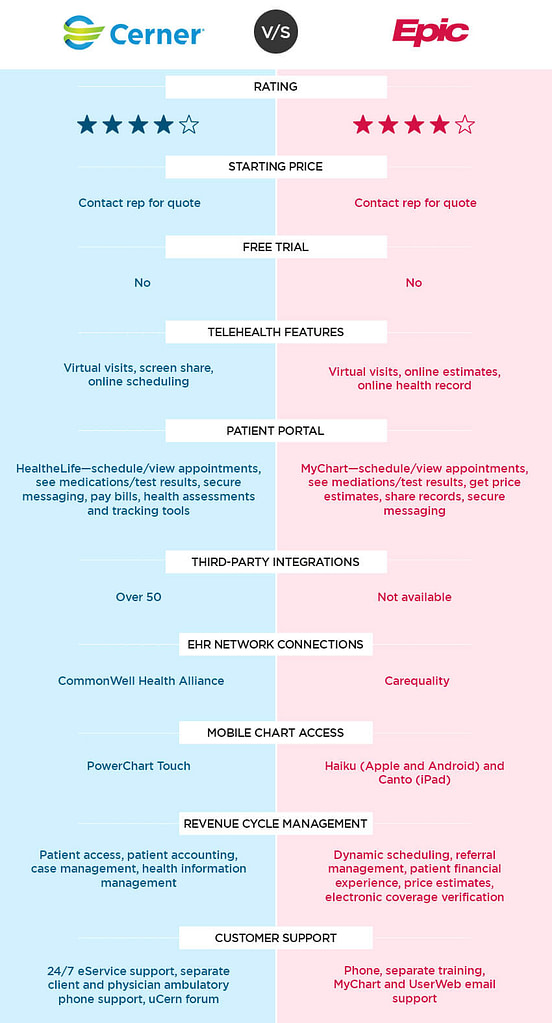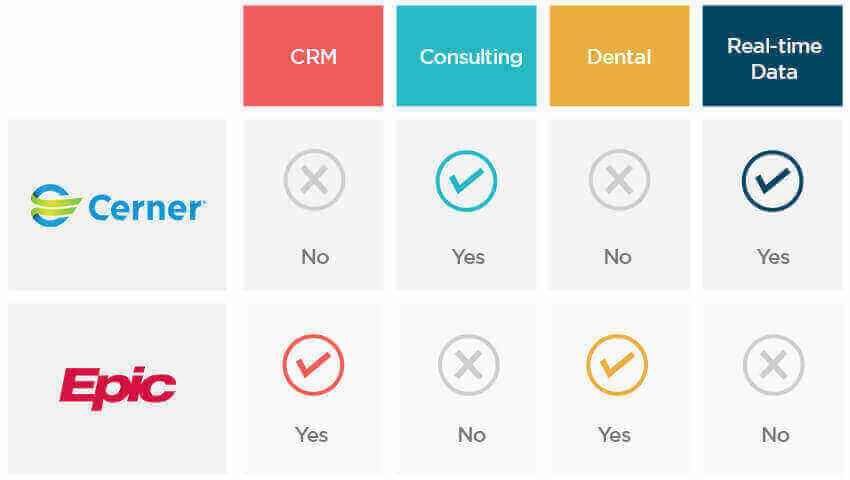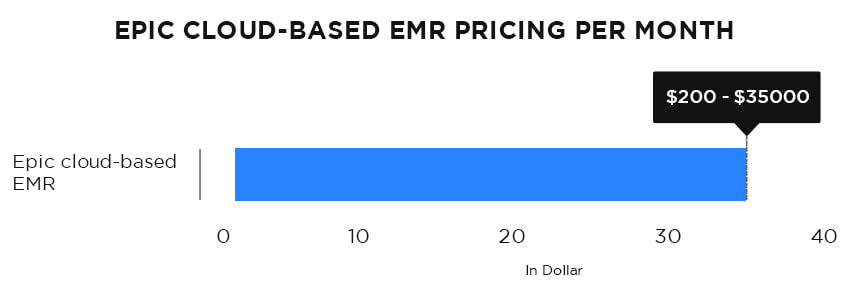Table of Contents
With the increasing adoption rate of EHR and EMR systems, the market size is predicted to reach over $47.6 billion by 2030. Of course, one can rightly guess why; today’s healthcare industry is a highly data-driven worldwide sector. So, the use of EMRs and EHR integration is inevitable. However, the hurdle most healthcare organizations encounter in their EHR adoption process is finding the right software.
Healthcare providers use multiple software, including telehealth solutions and practice management solutions. And with integrated EHR, workflows will become complex, interoperability will continue, and productivity will decrease. But the catch here is which EHR to invest in. Cerner and Epic are well-known names in the healthcare industry. These EHR vendors collectively control 55% of the acute care hospital market in the United States. Since these are large, expensive systems, there is little room for error when deciding which one your firm will utilize. Contracts typically exceed millions, if not billions, of dollars, and implementing the software can take anywhere from six months to more than a year, not to mention the time it takes workers to master the new system.
Cerner vs. Epic has changed indistinguishably, regularly keeping up with one another in innovations and new software functionalities. And this makes it difficult to determine the best option for a new EHR. In this article, we’ll compare their functionalities to help you choose one.
Comparing Cerner and Epic EHR Systems- Pros and Cons
The adoption and widespread use of electronic health record systems have greatly benefited the healthcare industry. It is significantly simpler to keep patients’ medical records safe and accessible these days. Technology makes things easier, but as software solutions evolve, the market expands and becomes more competitive. This results in more solutions, such as remote patient monitoring, being developed and made available to healthcare companies. In this competitive market, where every best healthcare mobile app development company delivers unique solutions, Cerner and Epic Software, two top-rated EHR solution firms, are at the top. Both offer EHR development, EHR integration with devices, and UI design in the healthcare industry. Now look at Cerner and Epic’s pros and cons regarding its usability and other factors.
Cerner vs. Epic: Which is Easier to Use?

The essential feature that might contribute to the success of any EHR on the market is its user-friendliness. In Cerner vs. Epic, let’s see which is more user-friendly-
Cerner Pros and Cons
Cerner offers an intuitive and user-friendly UI. It contains a patient portal with a secure, HIPAA-compliant messaging application. Cerner gives patients an encrypted way to communicate with their doctors, including the ability to ask questions and remain in touch with them to verify whether they are following their treatment plan precisely. Patients typically find it simple to obtain online prescription refills because the system is user-friendly. It also expedites the scheduling of virtual appointments. As a result, nurses prefer Cerner for charting.
On the contrary, certain pages on the portal can be confusing to users, who might also need help navigating. While there are worse options for a usable EHR, Cerner will still require certain training before staff feels comfortable working with it.
Epic Pros and Cons
Epic has been striving hard to build and develop its EHR into a user-friendly one. Epic EHR system offers a patient portal that allows patients to schedule appointments and securely view their health records. It also tells them how much a particular operation will cost them. Furthermore, both types of users, patients, and providers, can schedule virtual consultations within the system.
Despite Epic’s assurance of user-friendliness, many customers say the system is difficult to use. Due to the large number of Epic EHR’s capabilities, it can be not easy to navigate through different options. Epic’s sophisticated architecture can often make things tough for healthcare consumers because the needs of healthcare organizations dictate a simple EHR solution, which Epic might not be for some users.
Cerner vs. Epic: Which offers better Interoperability?

To share databases with other healthcare systems, providers require Interoperability and integration. Cerner and Epic are privately sponsored EHR systems that offer rapid healthcare integration resources. They enable numerous systems to connect and exchange data. Now let’s see in Cerner Epic interoperability which one is the best.
Cerner EHR system
Cerner supports Interoperability in a variety of methods. One method is through the CommonWell Health Alliance, the first and most popular non-profit industry trade association co-founded by Cerner and its six competitors. CommonWell Health Alliance’s standards and procedures enable members to access and share their patient data readily.
Cerner also provides Cerner Ignite APIs to enable integration between third-party apps and the EHR. Reference Lab Networks also enable Cerner users to share data with several “acute and reference labs” without connecting to each lab individually.
Epic EHR systems
One significant disadvantage of Epic is the lack of third-party app integrations, so you’d have to design them yourself if you wanted them. That being said, Epic does integrate with other EHR networks through Carequality. And that helps make sharing patients’ records easier with multiple providers. Epic also facilitates Interoperability in another way. Companies can connect via EpicCare Link, which enables non-Epic users to view patient information from an Epic user. It works similarly to Dropbox or Google Drive in that users gain access using a sharing link. Another interoperability tool that patients can use to share their health information with third-party providers is linking to Share Everywhere. This capability allows clinicians to examine patient data without connecting to Epic via an EHR.
Interestingly, because the Carequality and CommonWell networks can communicate with one another, this may be a moot point in the Cerner vs. Epic comparisons.
Cerner vs. Epic- Which offers better Customer Support

Cerner and Epic are both well-known for their excellent customer service. Both organizations feature customer support teams that can help with technical concerns, training, and ongoing maintenance.
Cerner electronic health records
Cerner has a support team dedicated to helping users understand its technological solutions and answering their questions to provide the best customer service possible. Cerner enhances customer service by providing eService via its portal, which is open 24/7. Cerner also trains existing staff members to provide the technical know-how for the system’s in-house installation.
On the downside, Cerner’s customer service might get slower, and consumers may have to wait longer to get responses to their inquiries.
Epic electronic health record systems
Epic has a team of technical professionals who can be reached via its phone number. Epic’s support service responds to users within 24 hours after their inquiry submission. Further, Epic’s newsletters keep users updated on industry news and trends. And when Epic changes its system, it sends semi-annual email newsletters to all its users with the latest information.
Despite these advantages, Epic is often reluctant towards user-requested updates. Some of the system’s operations require the assistance of many of its internal personnel during setup, making customer support expensive.
Cerner vs. Epic Cost- Which is Cheaper?
Regardless of the method, costs differ greatly from one another. Pricing is determined by criteria such as the features selected and the number of users accessing the system. There is a need to be pricing information on either the company’s website or through other ways, making EHR pricing comparisons difficult. You need to reach the company directly to obtain an estimate.
However, EHR cost for systems like Epic or core Cerner usually includes setup, maintenance, and hardware updates. All of these factors can add up to a substantial sum. However, Cerner is the cheaper alternative in this Epic vs. Cerner comparison.
Cerner Cost Per Hospital

Cerner’s pricing plan is unquestionably less expensive than Epic’s. As a result, the cost of Cerner PowerChart Ambulatory EHR could start at $25.00 per year. But Cerner PowerChart Ambulatory EHR does not have a free trial or a free version.
Epic Cost Per Hospital

The pricing for Epic cloud-based EMR systems can range from $200 to $35,000 per month, depending on the functionality available. These expenses include setup and training. However, certain vendors may charge for training separately. By including training expenditures, the charges might reach over $2,000.
Likewise, a self-hosted Epic EMR can range from $1,200 to $500,000 for major hospitals and clinics. Aside from this pricing, you may get an Epic EMR for anywhere between $1200 and $500,000 or more.
Overall, after accounting for all the additional costs associated with implementation and installation, the Cerner EHR software is considered a more inexpensive option. On the other hand, the Epic platform provides more value.
How Should You Choose?
Considering all aspects of features, functionalities, and pricing in this Cerner and Epic comparison, we’re sure you can decide which one to pick. What kind of EHR you select will be determined by criteria such as your organization’s needs, the level of customization and integration necessary, the training and support available, and the overall cost.
In terms of your organization’s requirements, you should examine the features of each vendor and select the solution that best fulfills your criteria.
We at OSP have an experienced team of developers who’ve worked on Epic and Cerner. From third-party integrations to customized APIs, our team can effortlessly implement them. And from our experience, if your practice is on budget and requires a simple, easy-to-use EHR, the Cerner hospital system is a good option. However, it might be sufficient for large practices offering multiple services and handling tons of data. In that case, Epic Systems would make a better option.
Conclusion
Cerner and Epic are top-tier electronic health record services, so you can go right with them. They will provide sophisticated patient and physician portals to make the task easier and faster. However, each software will perform better for different users. We hope this Cerner EHR vs. Epic EHR helps you choose the right software.
References

How can we help?
Fill out the short form below or call us at (888) 846-5382
Looking for software solutions to build your product?
Let’s discuss your software solutions for your product in our free development acceleration call!
Get In Touch arrow_forward
